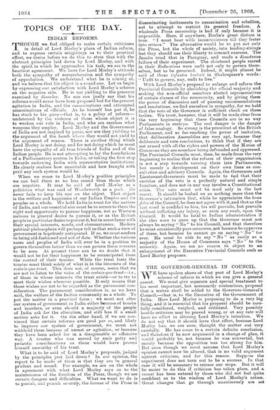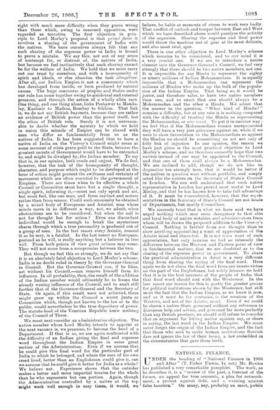THE GOVERNOR-GENERA.L IN COUNCIL.
WE have spoken above of that part of Lord Morley's scheme of reform to which we can give a general assent. We must give separate and special treatment to his most important, but necessarily contentious, proposal that a native shall be added to the Governor-General's Council,—that is, to the Executive of the Government of India. Here Lord Morley is proposing to do a very big thing, and it is essential that his proposal should be care- fully considered, weighed, and criticised. Very possibly hostile criticism may be proved wrong, or at any rate will have no effect in altering Lord Morley's intention. We do not say that it should have that effect, because Lord Morley has, we are sure, thought the matter out very carefully. He has come to a certain definite conclusion, and therefore if he now acquiesced in a change of plan, it would probably be, not because he was converted, but merely because the opposition was too strong for him. But even though we must assume that Lord Morley's opinion canuot now be altered, that is no valid argument against criticism, and for this reason. Suppose the experiment does not turn out to be a success. In that case it will be necessary to retrace our steps. But it will be easier to do this if criticism has taken place, and a caveat has been entered by those who did not feel quite confident as to the wisdom of Lord Morley's action. Great changes that go through unanimously are set right with much more difficulty when they prove wrong than those which, owing to reasoned opposition, were regarded as tentative. The first objection in prin- ciple to Lord Morley's proposal is that primci facie it involves a sharing of the government of India with the natives. We have ourselves always felt that any such sharing of the supreme power in India is bound to prove a mistake. We say this, not out of any sense of contempt for, or distrust of, the natives of India, but because we feel instinctively that such sharing cannot be for the welfare of India. We hold that we must carry out our trust by ourselves, and with a homogeneity of spirit and ideals, or else abandon the task altogether. After all, our Indian Empire is not a community which has developed from inside, or been produced by natural causes. The huge concourse of peoples and States under our rule has come together owing to accidental and external pressure, and through the action of a wholly alien race. One thing, and one thing alone, links Peshawur to Manda- lay, Kashmir to Madras' Bombay to Sikkim. That link is, we do not say British bayonets, because they are rather an evidence of British power than the power itself, but the ethos of British rule. Surely it is not unreason- able to doubt whether the mystery by which we hold in union this miracle of Empire can be shared with men who differ so fundamentally from us as the natives of India. It has been suggested that to have a native of India on the Viceroy's Council might mean at some moment of crisis grave peril to the State, because the greatest secrets of Government would have to be entrusted to, and might be divulged by, the Indian member. To say that is, in our opinion, both crude and unjust. We do feel, however, that the lack of the homogeneity of thought, character, and purpose which ought to be developed at the hour of action might prevent the swiftness and certainty of movement which are often essential to the government of Empires. There are times when to be effective a whole Council or Committee must have but a single thought, a single spirit, informing it,—must not only speak and act, but must feel, like one man, and from instinct and nature rather than from reason. Could such unanimity be obtained by a mixed body of Europeans and Asiatics, men whose minds move in so different a way, not, we admit, when abstractions are to be considered, but when the call is not for thought but for action ? Even one discordant individual would be enough to break the mysterious charm through which a true personality is produced out of a group of men. In the last resort every Asiatic, conceal it as he may, is a fatalist. In the last resort no European, pretend as he will, is really anything but a believer in free will. From both points of view great actions may come. They will not come from a compromise between the two.
But though we feel this so strongly, we do not say that it is an absolutely fatal objection to Lord Morley's scheme. India is no doubt ruled in theory by the Governor-General in Council. But the Governor-General can, if he likes, act without his Council,—can remove himself from its influence. In all probability, then, the result of the addition of the Indian member would ultimately be to lessen the already waning influence of the Council, and to exalt still further that of the Governor-General and the Secretary of State. Or again, if this result were not achieved, there might grow up within the Council a secret junta or Committee which, though not known to the law or to the public, would nevertheless be the true depositary of power. The statute-book of the Venetian Republic knew nothing of the Council of Three.
We must next consider an administrative objection. The native member whom Lord Morley intends to appoint at the next vacancy is, we presume, to become the head of a Department. If that is so, we are again confronted with the difficulty of an Indian giving the final and supreme word throughout the Indian Empire in some great section of the Administration. Even if we assume that be could (rive this final word for the particular part of India to which he belonged, and where the men of his own creed lived, better than an Englishman could give it, can we assume that he could give it better for India as a whole? We believe not. Experience shows that the outsider makes a better and more impartial trustee for the whole than he who represents but one portion. Again, though the Administration controlled by a native at the top might work well enough in easy times, it would, we believe, be liable at moments of stress to work very badly. That conflict of outlook and temper between East and West which we have described above would paralyse the activity of the organism. Sharing the supreme and final power would throw the machine out of gear at its most delicate, and also most vital, spot.
There is one other objection to Lord Morley's scheme which remains to be considered, and to our mind it is a very crucial one. If we are to introduce a native element into the Governor-General's Council, we feel very strongly that there should be two native members, not one. It is impossible for any Hindu to represent the eighty, or ninety millions of Indian Mohammedans. It is equally impossible that a Mohammedan can represent the millions of Hindus who make up the bulk of the popula- tion of the Indian Empire. That being so, it would be juster, and therefore safer, to have two native members than one, and to enact that one should always be a Mohammedan and the other a Hindu. We admit that the answer to the question, "What kind of Hindu?" remains a difficulty, but at any rate it is nothing compared with the difficulty of treating the Hindu as representing the Mohammedan, or vice versa,. To put it in another way : we feel that if the Mohammedans remain unrepresented they will have a very just grievance against us, while if we were to show favouritism to the Mohammedans as against the Hindus we should be committiug an act not only of folly but of injustice. In our opinion, the reason we have just given is the most practical objection to Lord Morley's scheme, and we therefore earnestly hope that two natives instead of one may be appointed to the Council, and that one of them shall always be a Mohammedan. We are inclined to add, though we do not like to dogmatise too strongly here, that it would be better if the natives in question were without portfolio, and simply acted like the natives on the Secretary of State's Council in London. We can well understand that such native representation in London has proved most useful to Lord Morley, and that he has known how to take full advantage of it. It must be remembered, however, that the repre- sentatives in the Secretary of State's Council are not heads of Departments, but merely Councillors.
We sincerely trust that in what we have said we have urged nothing which may seem derogatory to that able and loyal body of native notables and administrators from whom will be drawn the proposed addition to the Viceroy's Council. Nothing is farther from oar thought than to show anything approaching a want of appreciation of the Asiatic mind and character. It is not from want of such appreciation, but only because we feel so intensely the difference between the Western and Eastern point of view in fundamental matters, that we are doubtful as to the sharing of the supreme power in government. To share the practical administration in detail is a very different thing from sharing the saying of the final word. Here again we do not claim the final word from any innate virtue on the part of the Englishman, but solely because we hold. that it is in the best interests of the people of India that that final word should rest with the Westerner. In the last resort our reason for this is partly the greater genius for political institutions shown by the Westerner, but still more the fact that the Indian Empire, as we know it now, and as it must be for centuries, is the creation of the Western, and not of the Asiatic, mind. Even if we could be shown a native State governed without any reference to European help and advice, and governed far more perfectly than any British province, we should still refuse to consider that an argument for letting native opinion say, or share in saying, the last word in the Indian Empire. We must never forget the origin of the Indian Empire, and the fact that those who seek to make human institutions flourish dare not ignore the law of their being, a law embedded in the circumstances that gave them birth.







































 Previous page
Previous page